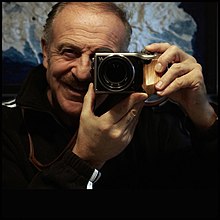|
Augusto De Luca
Augusto De Luca (Napoli, 1 July 1955) is an Italian photographer specialized in portraits.[2][3][4] BiographyAfter a conventional high school education, he enrolled in university and obtained a law degree. In the mid-1970s, his interest in photography led him to become a professional photographer.[5][6] He then began to work in traditional photography and portraiture[2][3] but also for experimental photography[4] experimenting with a wide variety of materials. His style is characterized by a particular attention to highlighting the smallest expressive details of the framed object. His work includes images of pure realism, as well as others in which forms and signs combine according to indications inspired by the philosophy of metaphysics.[6]  He has exhibited in a number of Italian and foreign galleries, museums and institutional headquarters, including the Italian Chamber of Deputies in Rome. During his career, he has also produced record covers, billboards and photography books.[5][6] In 1987, he directed the scenes for the television program Samarcanda directed by journalist Michele Santoro. He taught the art of photography at the Montecitorio Club of the Italian Chamber of Deputies.[7] His books have been featured in essays, specialized magazines, and theme programs on Italian television Rai 2,[8] and Rai 3[9] are introduced in their preface or explanatory texts by cultural figures such as poet Mario Luzi, director Lina Wertmuller, historian Giovanni Pugliese Carratelli, journalists Maurizio Costanzo and Sandro Curzi, architect Paolo Portoghesi, composer Ennio Morricone. In 1995, an exhibition of his photographs at the Italian Chamber of Deputies was inaugurated by President Giorgio Napolitano and the "Onorevoli" parliamentarians Nilde Iotti and Carlo Azeglio Ciampi.[6] In 1996, he was awarded the "città di Roma" prize for the photographs in the book Roma Nostra[10] and composer Ennio Morricone for the poem "Roma Amore" published in the same book. Augusto De Luca returned to Naples around 2005, after living in Rome, he became particularly interested in graffiti.[5] Books
References
External linksWikimedia Commons has media related to Augusto De Luca.
Information related to Augusto De Luca |
||||||||||||||||||||
Portal di Ensiklopedia Dunia

